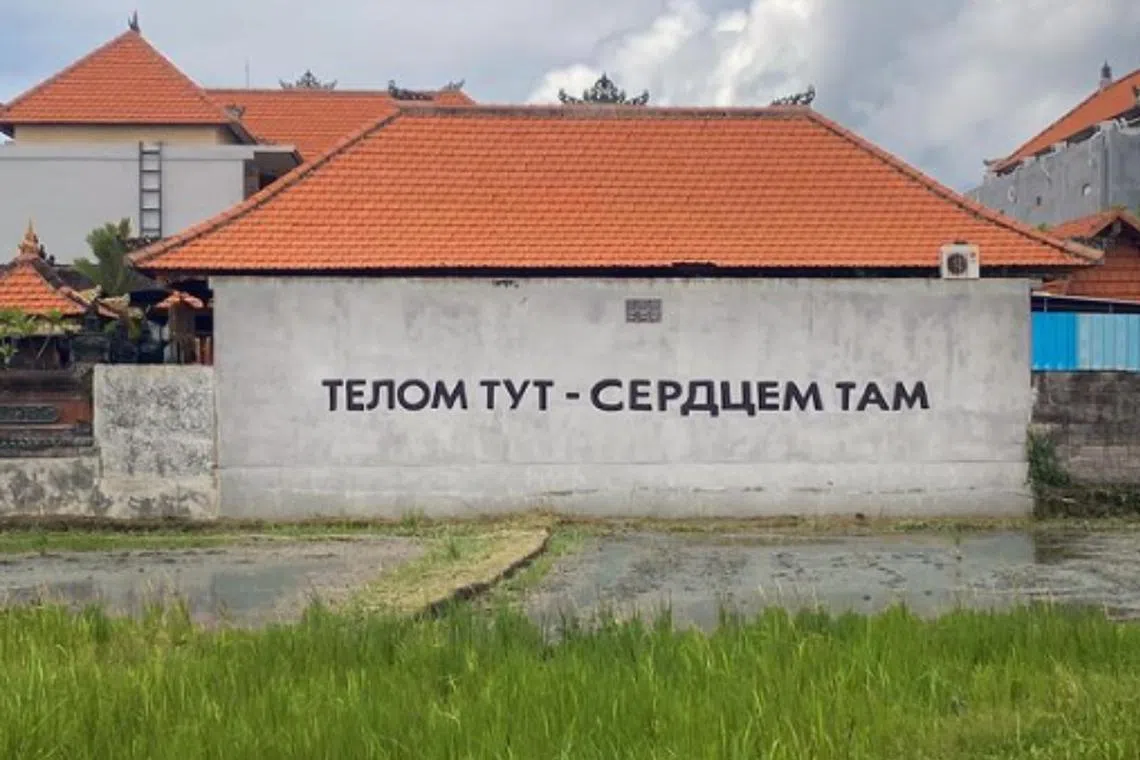In Bali, a Russian mural triggers backlash against a fast-growing coterie of expats
Sign up now: Get insights on Asia's fast-moving developments

Mr Sergei Ovseikin stencilled in black Cyrillic lettering measuring 40cm high Russian words meaning “Body Here – Heart There”.
PHOTO: ZUKCLUB/INSTAGRAM
Follow topic:
BALI – In mid-January, under the cover of darkness, Russian street artist Sergei Ovseikin slipped into a rice paddy in Canggu, Bali, to paint one of his most controversial works yet.
Using a projector, he stencilled “Body Here – Heart There” in Russian, with black Cyrillic lettering measuring 40cm high, on a concrete wall of a neighbouring house.
The words convey a common lament among conscription-aged Russian men abroad, who can be pressed into military service to fight against Ukraine if they return to Russia.
The work of art, however, has found little sympathy on Indonesia’s tourist island of Bali, and drawn flak for disrespecting local culture.
Mr Ovseikin, 34, refers to his work as a mural.
Speaking with The Straits Times from Montenegro, where he is residing for now, Mr Ovseikin said he is a “refugee” deserving empathy, like many Russians.
“If I fly to Russia, I can be forced to join the army and fight Ukrainians and kill people... I have a lot of friends living in Ukraine. I did not start the war and I want it to end.”
To others, his work is only so much graffiti.
It has touched off a firestorm of criticism that reflects growing frustration among Indonesian residents, politicians and police towards the nearly 15,000 Russians who have settled in Bali since the onset of the Ukraine war.
On Mr Ovseikin’s personal Instagram account, @zukclub, where posts typically receive a few dozen comments, the post depicting the Canggu mural has had more than 720 comments – many of them critical – as well as 4,000 likes.
The message has struck a nerve among locals and non-Russian expats alike.
“Very disrespectful,” wrote @nachoaor, a Spanish national living in Bali. The Instagram post added: “What about the locals? What about the international community that doesn’t speak Russian? Totally unacceptable.”
Ms Ni Luh Djalantik, a local entrepreneur who has amassed 433,000 followers on Instagram in part by taking a hard line with foreigners behaving badly, told ST Mr Ovseikin was disrespecting Balinese norms.
“If I go to Moscow and scribble ‘Om Swastyastu’ in Sanskrit on a random house, what would happen to me?” she asked, referring to the traditional Balinese greeting.
She posted a video in late January of her confrontation with a teenager, also a Russian, who was spray-painting graffiti on the wall outside an elementary school.
The boy’s father publicly apologised and accompanied his son to paint over the graffiti in front of the police, local media reported on Jan 31.
“This is not about a particular nationality,” Ms Ni Luh said, adding that the case is unrelated to Mr Ovseikin’s mural.
“This is our home. We build temples to show our devotion to our home until the day we die. If foreigners want to make Bali their home, they must respect it as we do.”
The sudden influx of Russian – mostly male – expatriates with little experience of living abroad has brought some of them to the attention of the local authorities.
Most come into contact with the police owing to traffic accidents, Bali police spokesman Stefanus Satake Bayu Setiono told ST.
“It’s mostly because of careless driving. Some had never ridden a scooter before coming here,” Senior Commissioner Stefanus said.
At the end of 2022, roughly a 10th of the 80 or so foreigners serving jail sentences in Bali were Russian nationals.
They share the dubious distinction of being the second-biggest group of foreigners serving time on the island – mostly for drug offences – alongside United States citizens. Australians were the most numerous, with a dozen of them behind bars on the island.
In 2022, Russians nationals were the 10th-largest contingent arriving in Bali, numbering nearly 58,000. Australians accounted for more than 600,000 arrivals, followed by those from India, Singapore, Britain and the US, according to government data.
Mr Ovseikin said his decision to leave Bali was unrelated to the controversy surrounding his mural, adding that Canggu had become too expensive and crowded with foreign nationals.
The artist defended his mural and use of Russian, saying he is communicating an anti-war message to his countrymen.
“Perhaps one of them will also change their minds,” he said.


